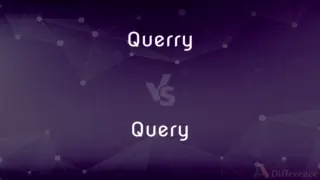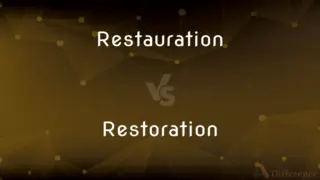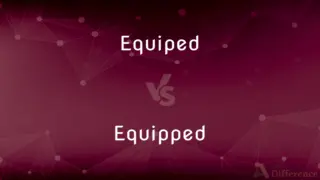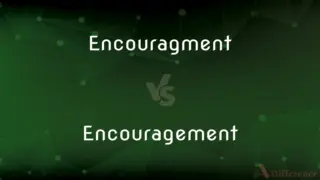Intelligency vs. Intelligence — Which is Correct Spelling?
Edited by Tayyaba Rehman — By Maham Liaqat — Updated on April 16, 2024
Intelligency is the incorrect spelling of intelligence, which refers to the ability to acquire and apply knowledge and skills.
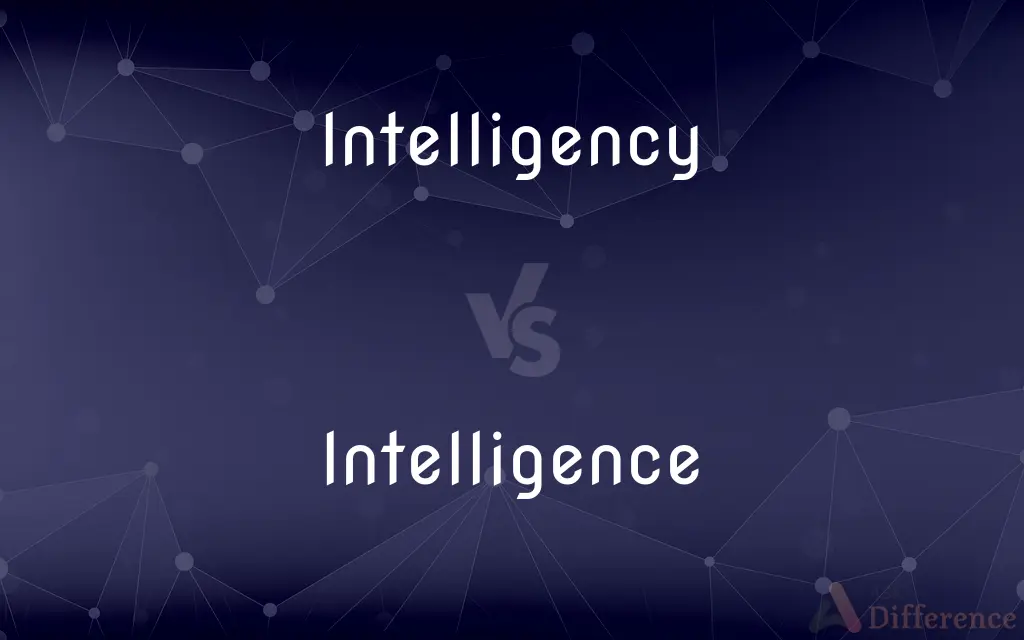
Table of Contents
Which is correct: Intelligency or Intelligence
How to spell Intelligence?

Intelligency
Incorrect Spelling

Intelligence
Correct Spelling
ADVERTISEMENT
Key Differences
Note that intelligence comes from the root word "intelligent," where there is no 'y'.
The suffix "-ence" in intelligence indicates a state or condition, commonly found in other similar words like "absence" or "presence."
Remember that intelligence ends with "-ence" rather than "-ency".
Avoid the common error of switching '-ence' with '-ency' by practicing spelling words that end in '-ence'.
How Do You Spell Intelligence Correctly?
Incorrect: His natural intelligency makes him a good candidate for this job.
Correct: His natural intelligence makes him a good candidate for this job.
ADVERTISEMENT
Incorrect: His supposed intelligency was questioned when he failed the basic math test.
Correct: His supposed intelligence was questioned when he failed the basic math test.
Incorrect: Her emotional intelligency is evident in how she handles stressful situations.
Correct: Her emotional intelligence is evident in how she handles stressful situations.
Incorrect: They rely on artificial intelligency for customer support.
Correct: They rely on artificial intelligence for customer support.
Incorrect: She praised his high intelligency during the meeting.
Correct: She praised his high intelligence during the meeting.
Intelligence Definitions
The ability to learn, understand, and make judgments or have opinions that are based on reason.
The test measures the level of your intelligence.
Information gathered by a government or organization about an enemy or competitor.
The agency collects intelligence on foreign threats.
Secret information that is collected about an enemy or opponent.
The spy provided intelligence that helped avert a crisis.
The ability to perform computer functions in a human-like manner.
Modern cars use artificial intelligence for navigation.
Intelligence has been defined in many ways: the capacity for logic, understanding, self-awareness, learning, emotional knowledge, reasoning, planning, creativity, critical thinking, and problem-solving. More generally, it can be described as the ability to perceive or infer information, and to retain it as knowledge to be applied towards adaptive behaviors within an environment or context.
The ability to acquire, understand, and use knowledge
A person of extraordinary intelligence.
Information, especially secret information gathered about an actual or potential enemy or adversary.
The gathering of such information
"Corporate intelligence relies on a slew of tools, some sophisticated, many quite basic" (Neil King and Jess Bravin).
An agency or organization whose purpose is to gather such information
An officer from military intelligence.
An intelligent, incorporeal being, especially an angel.
Of mind, especially to understand principles, truths, facts or meanings, acquire knowledge, and apply it to practice; the ability to comprehend and learn.
The quality of making use or having made use of such capacities: depth of understanding, mental quickness.
(countable) An entity that has such capacities.
, often secret, about an enemy or about hostile activities.
(countable) A political or military department, agency or unit designed to gather information, usually secret, about the enemy or about hostile activities.
(dated) acquaintance; intercourse; familiarity.
The act or state of knowing; the exercise of the understanding.
The capacity to know or understand; readiness of comprehension; the intellect, as a gift or an endowment.
And dimmed with darkness their intelligence.
Information communicated; news; notice; advice.
Intelligence is given where you are hid.
Acquaintance; intercourse; familiarity.
He lived rather in a fair intelligence than any friendship with the favorites.
Knowledge imparted or acquired, whether by study, research, or experience; general information.
I write as he that none intelligenceOf meters hath, ne flowers of sentence.
An intelligent being or spirit; - generally applied to pure spirits; as, a created intelligence.
The great Intelligences fairThat range above our mortal state,In circle round the blessed gate,Received and gave him welcome there.
The division within a military organization that gathers and evaluates information about an enemy.
The ability to comprehend; to understand and profit from experience
A unit responsible for gathering and interpreting information about an enemy
Secret information about an enemy (or potential enemy);
We sent out planes to gather intelligence on their radar coverage
New information about specific and timely events;
They awaited news of the outcome
The operation of gathering information about an enemy
A person's capacity for logic, understanding, self-awareness, learning, emotional knowledge, planning, and problem-solving.
Emotional intelligence is key in social interactions.
Intelligence Meaning in a Sentence
Artificial intelligence is transforming how we interact with technology.
She demonstrated great intelligence in handling the complex issue.
Intelligence allows us to solve problems quickly and effectively.
Children show intelligence from a very young age.
The government agency uses satellites to gather intelligence.
His intelligence report was crucial in making the strategic decision.
Higher intelligence often leads to better decision-making skills.
In the meeting, he displayed a level of intelligence that impressed everyone.
Intelligence tests do not measure wisdom or common sense.
Good intelligence gathering can save lives during wartime.
We need better intelligence before we make a decision.
Their research contributes to the field of artificial intelligence.
Intelligence is not just about academic skills but also about understanding emotions.
Some games are designed to improve cognitive intelligence.
Emotional intelligence is as important as academic intelligence.
The intelligence of animals can be surprising.
She applied her intelligence to solve the daily crossword puzzle.
They use artificial intelligence to predict shopping patterns.
He has an intelligence that makes him stand out in debates.
His intelligence was evident in his quick responses.
Intelligence Idioms & Phrases
Emotional intelligence
The ability to understand, use, and manage emotions effectively.
Leaders with high emotional intelligence can better motivate their team.
Act on intelligence
To take action based on information gathered.
The police acted on intelligence to prevent the robbery.
Military intelligence
Information related to armed forces or conditions in an area of operation.
Military intelligence was crucial for the success of the operation.
Intelligence quotient (IQ)
A measure of a person's reasoning ability.
His high IQ reflects his analytical intelligence.
Artificial intelligence
Technology simulating human cognitive functions.
Artificial intelligence can learn and adapt to new situations.
Business intelligence
Analyzing data to help enterprises make decisions.
Business intelligence tools help companies improve profitability.
Gather intelligence
Collecting information about an area, group, or activities.
Agents were sent to gather intelligence on the group.
Strategic intelligence
Information that provides long-term planning of operations.
The company used strategic intelligence to enter new markets.
Human intelligence
Information gathered by human sources.
Human intelligence remains invaluable despite advances in technology.
Signals intelligence
Intelligence-gathering by interception of signals.
Signals intelligence can reveal a lot about enemy communications.
Open-source intelligence
Information collected from publicly available sources.
Open-source intelligence uses data from the internet and media.
Measure intelligence
To assess the intelligence level of an individual.
Various tests are used to measure intelligence.
Tactical intelligence
Information used to support short-term decisions.
The general used tactical intelligence to make battlefield decisions.
High intelligence
Having superior cognitive abilities.
High intelligence often leads to exceptional problem-solving skills.
Intelligence failure
A significant error in gathering or interpreting information.
The mission failed due to an intelligence failure.
Raw intelligence
Information that has not been analyzed or processed.
Analysts assess raw intelligence to determine its value.
Low intelligence
Having below average cognitive abilities.
Support programs are available for those with low intelligence.
Boost intelligence
To enhance one's intellectual ability.
Reading widely is believed to boost intelligence.
Share intelligence
Distributing information among organizations.
Countries often share intelligence to combat global threats.
Cognitive intelligence
Relating to the mental process of knowing, including aspects such as awareness, perception, reasoning, and judgment.
Cognitive intelligence plays a crucial role in learning.
Common Curiosities
What is a stressed syllable in intelligence?
The stressed syllable in intelligence is the second syllable: "tel."
Why is it called intelligence?
Intelligence comes from the Latin "intelligentia," meaning understanding, discernment, based on the ability to distinguish or discriminate.
How is intelligence used in a sentence?
Intelligence is often used to refer to someone’s ability to understand and learn quickly.
How do we divide intelligence into syllables?
Intelligence is divided into syllables as follows: in-tel-li-gence.
What is the verb form of intelligence?
Intelligence is a noun; it does not have a verb form.
What is the pronunciation of intelligence?
Intelligence is pronounced as /ɪnˈtel.ɪ.dʒəns/.
What is the root word of intelligence?
The root word of intelligence is "intelligent."
How many syllables are in intelligence?
There are four syllables in intelligence.
What is the singular form of intelligence?
The singular form is intelligence.
What is the plural form of intelligence?
The plural form is intelligences.
What is the opposite of intelligence?
The opposite of intelligence is ignorance.
Is intelligence a noun or adjective?
Intelligence is a noun.
Is intelligence an adverb?
No, intelligence is not an adverb.
Is intelligence a negative or positive word?
Intelligence is generally considered a positive word.
Which vowel is used before intelligence?
Typically, "an" is used before intelligence due to the vowel sound at the start.
Is intelligence a vowel or consonant?
Intelligence starts with a vowel sound.
Is the intelligence term a metaphor?
The term intelligence itself is not a metaphor, but it can be used metaphorically.
Is the word intelligence is imperative?
No, intelligence cannot be imperative as it is not a verb.
Which article is used with intelligence?
The article "the" is often used with intelligence.
What part of speech is intelligence?
Intelligence is a noun.
What is another term for intelligence?
Another term for intelligence is intellect.
Is intelligence a countable noun?
No, intelligence is usually used as an uncountable noun.
Is intelligence a collective noun?
No, intelligence is not a collective noun.
Is the word intelligence Gerund?
No, intelligence is not a gerund; it is a noun.
Is the word “intelligence” a Direct object or an Indirect object?
Intelligence can serve as a direct object in a sentence.
Which determiner is used with intelligence?
Determiners such as "some" or "much" can be used with intelligence.
Which preposition is used with intelligence?
Common prepositions used with intelligence include "of" and "in."
Is intelligence an abstract noun?
Yes, intelligence is an abstract noun.
Which conjunction is used with intelligence?
Conjunctions like "and" or "but" are commonly used with intelligence.
Share Your Discovery
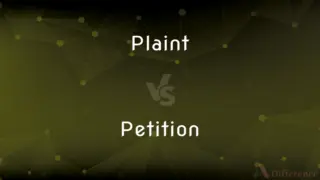
Previous Comparison
Plaint vs. Petition
Next Comparison
Assesment vs. AssessmentAuthor Spotlight
Written by
Maham LiaqatEdited by
Tayyaba RehmanTayyaba Rehman is a distinguished writer, currently serving as a primary contributor to askdifference.com. As a researcher in semantics and etymology, Tayyaba's passion for the complexity of languages and their distinctions has found a perfect home on the platform. Tayyaba delves into the intricacies of language, distinguishing between commonly confused words and phrases, thereby providing clarity for readers worldwide.


